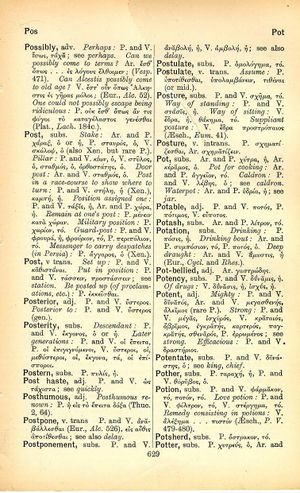possibly: Difference between revisions
τί δὲ βλέπεις τὸ κάρφος τὸ ἐν τῷ ὀφθαλμῷ τοῦ ἀδελφοῦ σου, τὴν δὲ ἐν τῷ σῷ ὀφθαλμῷ δοκὸν οὐ κατανοεῖς → why do you look at the speck of sawdust in your brother's eye and pay no attention to the plank in your own eye | and why beholdest thou the mote that is in thy brother's eye, but considerest not the beam that is in thine own eye | why do you see the speck that is in your brother's eye, but don't consider the beam that is in your own eye
(Woodhouse 4) |
(CSV4) |
||
| Line 1: | Line 1: | ||
{{ | {{Woodhouse1 | ||
| | |Text=[[File:woodhouse_629.jpg|thumb|link={{filepath:woodhouse_629.jpg}}]]'''adv.''' | ||
<b class="b2">Perhaps</b>: P. and V. [[ἴσως]], [[τάχα]]; see [[perhaps]]. | |||
<b class="b2">Can we posibly come to terms?</b> Ar. ἔσθʼ [[ὅπως]] . . . ἐς λόγους ἔλθοιμεν; (<b class="b2">Vesp.</b> 471). | |||
<b class="b2">Can Alcestis possibly come to old age?</b> V. ἔστʼ οὖν [[ὅπως]] Ἄλκηστις ἐς [[γῆρας]] μόλοι; (Eur., ''Alc.'' 52). | |||
<b class="b2">One could not possibly escape being ridiculous</b>: P. οὐκ ἔσθʼ [[ὅπως]] ἄν τις φύγοι τὸ [[καταγέλαστος]] γενέσθαι (Plat., ''Lach.'' 184C.). | |||
}} | }} | ||
Revision as of 09:48, 21 July 2017
English > Greek (Woodhouse)
adv.
Perhaps: P. and V. ἴσως, τάχα; see perhaps. Can we posibly come to terms? Ar. ἔσθʼ ὅπως . . . ἐς λόγους ἔλθοιμεν; (Vesp. 471). Can Alcestis possibly come to old age? V. ἔστʼ οὖν ὅπως Ἄλκηστις ἐς γῆρας μόλοι; (Eur., Alc. 52). One could not possibly escape being ridiculous: P. οὐκ ἔσθʼ ὅπως ἄν τις φύγοι τὸ καταγέλαστος γενέσθαι (Plat., Lach. 184C.).

